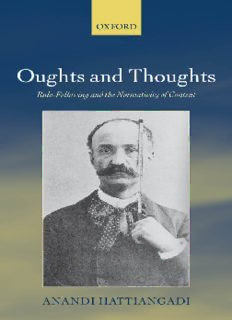
Oughts and Thoughts: Scepticism and the Normativity of Meaning PDF
Preview Oughts and Thoughts: Scepticism and the Normativity of Meaning
OUGHTS AND THOUGHTS RULE-FOLLOWING AND THE NORMATIVITY OF CONTENT This page intentionally left blank Oughts and Thoughts Rule-Following and the Normativity of Content CLARENDONPRESS·OXFORD 1 GreatClarendonStreet,Oxfordox26dp OxfordUniversityPressisadepartmentoftheUniversityofOxford. ItfurtherstheUniversity’sobjectiveofexcellenceinresearch,scholarship, andeducationbypublishingworldwidein Oxford NewYork Auckland CapeTown DaresSalaam HongKong Karachi KualaLumpur Madrid Melbourne MexicoCity Nairobi NewDelhi Shanghai Taipei Toronto Withofficesin Argentina Austria Brazil Chile CzechRepublic France Greece Guatemala Hungary Italy Japan Poland Portugal Singapore SouthKorea Switzerland Thailand Turkey Ukraine Vietnam OxfordisaregisteredtrademarkofOxfordUniversityPress intheUKandincertainothercountries PublishedintheUnitedStates byOxfordUniversityPressInc.,NewYork ©AnandiHattiangadi2007 Themoralrightsoftheauthorshavebeenasserted DatabaserightOxfordUniversityPress(maker) Firstpublished2007 Allrightsreserved.Nopartofthispublicationmaybereproduced, storedinaretrievalsystem,ortransmitted,inanyformorbyanymeans, withoutthepriorpermissioninwritingofOxfordUniversityPress, orasexpresslypermittedbylaw,orundertermsagreedwiththeappropriate reprographicsrightsorganization.Enquiriesconcerningreproduction outsidethescopeoftheaboveshouldbesenttotheRightsDepartment, OxfordUniversityPress,attheaddressabove Youmustnotcirculatethisbookinanyotherbindingorcover andyoumustimposethesameconditiononanyacquirer BritishLibraryCataloguinginPublicationData Dataavailable LibraryofCongressCataloginginPublicationData Dataavailable TypesetbyLaserwordsPrivateLimited,Chennai,India PrintedinGreatBritain onacid-freepaperby BiddlesLtd.,King’sLynn,Norfolk ISBN978–0–19–921902–5 1 3 5 7 9 10 8 6 4 2 ToKristerandVikram This page intentionally left blank Preface This book began its life as a doctoral dissertation, carried out under the supervision of Martin Kusch and Peter Lipton, at the Department of History and Philosophy of Science, Cambridge University. I would like to thank Martin for the animated disagreements which fuelled the arguments in the thesis and continue to fuel the arguments in the book, as well as his invariably thorough scrutiny of my work. I am grateful to Peter for his encouragement, his remarkable gift for making confused ideas lucid, and his ability to deliver devastating criticism gently. I would also like to thank Simon Blackburn and Bob Hale—who examined the dissertation—for their penetrating criticisms and suggestions for improvement. Research towards the dissertation was financially supported in the form of an Overseas Research Studentship, grants from the Cambridge Commonwealth Trust,TheSocialSciencesandHumanitiesResearchCouncilofCanada andTrinityCollege,Cambridge.Theprocessofturningthedissertation intoabookmanuscriptwaslargelycompletedduringthefourglorious yearswhileIwasaResearchFellowatTrinityCollege,Cambridge. Portions of this work draw upon material that has been published previously. Much of the material in Chapter 7 appears in ‘Is Meaning Normative’ (published in Mind and Language, 2002, pp. 220–40), and the discussion of Brandom in Chapter 6 draws on ‘Making It Implicit: Brandom on Rule Following’ (published in Philosophy and PhenomenologicalResearch,2003:419–31).Earlierdraftsofthematerial that makes up thisbook were presented at various seminars, including theDepartmentalSeminarattheDepartmentofHistoryandPhilosophy ofScience,CambridgeandtheMoralSciencesClub,Cambridge.Iam grateful to the audiences of both sessions for their incisive comments. I would also like to thank So¨ren Stenlund, who invited me to present myworkathisseminarinphilosophyoflanguageattheDepartmentof Philosophy,UppsalaUniversity.PeterPaginandKathrinGlu¨erkindly invited me to discuss my work at the philosophy of language seminar at the Department of Philosophy, Stockholm University. I would like to thank them both for the discussion on that occasion, as well as for all of the discussions we have had over the years since then. They are wonderful allies to have—despite our broad agreement, they are very viii OughtsandThoughts much alive to errors and potential objections. I would like to thank MartinKuschforinvitingmetotheSymposiumonTheNormativityof Meaning,Wissenschaftskolleg zuBerlin. I profitedtremendouslyfrom discussions with the participants at that workshop. Finally, I would like to thank John Broome for inviting me to present my work at his graduate seminar at the Faculty of Philosophy at Oxford University. I amgratefultothecommentsofparticipantsofthissessionandfortheir helpfulcommentsandsuggestions. Many friends and family members have contributed to this project with comments and criticism—or the odd question which has trig- gered major revision. These include Arif Ahmed, Gustaf Arrhenius, AnitaAvramides,StephenButterfill,ErikCarlson,AnjanChakravartty, Cathy Gere, Martin Gustafsson, Jane Heal, Henry Jackman, Carrie Jenkins, Neil Manson, Christina McLeish, Hugh Mellor, Alex Miller, Amartya Sen, Mark Sprevak, Åsa Wikforss, Tim Williamson, and my father—JagdishHattiangadi.ThankstoMartaWeissforsuggestingthe coverillustration.IamgratefultoPeterMomtchiloff,JacquelineBaker, and Victoria Patton at Oxford University Press, and their anonymous readers,whosedetailedcommentsmadeagreatdifferencetothebook. Finally, I owe a tremendous debt of gratitude to Krister Bykvist, who has been the first person I turn to with any of my problems, philosophicalorotherwise.ItwasKristerwhofirstsuggestedthatIlook closely at the normativity thesis, and who helped to bring me up to speed on meta-ethics and deontic logic. Krister read and commented on countless drafts of this work, and has discussed both minor and major points at greater length than they no doubt deserve, at times whenheprobablywouldhavepreferredtobedoingsomethingelse.He is a tremendous source of strength, support, encouragement, rigorous arguments, and ingenious ideas for getting out of tight spots; he is a wonderfulfathertooursonandmyclosestfriend. Contents 1. Introduction 1 2. TheScepticalArgument 11 Thesceptic’schallenge 11 Thescopeofthescepticalargument 15 Thescepticalargument 21 Conclusion 34 3. NormsandNormativity 37 Fromnormativitytonon-factualism 38 Thefirsthornofthedilemma:the‘naturalisticfallacy’ 39 Thesecondhornofthedilemma:queerness 47 Fromnormstonormativity 51 Norm-relativity 61 Conclusion 63 4. CanwedoWithoutSemanticFacts? 65 Thescepticalsolution 66 Theincoherencecharge 69 Semanticnon-factualismanddeflationism 74 Thesocialconstructionofmeaning 87 Conclusion 103 5. Reductionism 105 Dispositionalismrealism 105 Dispositionsandconditionals 109 Extendeddispositionalism 116 Successsemantics 120 Teleosemantics 126 Asymmetricdependence 133 Thecausaltheoryofreference 141 Collectivism 144 Conclusion 149
Description: